This month I break the monthy historical reporting because I traveled for most of June and am still on the road as this month’s essay reaches you, and please excuse the unedited writing. This is just thoughts pieced together while on the move.
The travels began with a week in Salento during the second week of June. I arrived there through my favorite route: I land in Naples, get in a car, and drive down; it’s a beautiful and peaceful ride, suitable for contemplation, and it takes about four hours, which are great for dissociating with air travel and for entering into the old world. Driving stick and a stop at the Autogrill are the final passages into the Italian dimension. I have tried different ways to get down to Salento from my home in Houston. It’s always about 24 hours of travel no matter how I slice it.
Once I arrive in my original hometown, I must abandon the car on street near the castle and walk, as cars have been thankfully, if inconveniently, forbidden in many Italian historic centers. And that has made all the difference for these old towns.
After a year’s absence I was back in the archive room in Francavilla Fontana. When I enter the family’s house in Francavilla I am reminded that I occupy two worlds: my Salentine world and my American world. That house is the portal through which I slip into my Salentine being. I suddenly remember the local dialect, I find natural the old architecture, the different pace of life, the tastes and the smells, the sounds. My beloved church bells have been replaced by electronic facsimiles I have been told, but I would not have noticed on my own. They are good replicas, necessary from a lack of young men willing to give their life to the church and pull a rope with a bell attached to it every fifteen minutes.
If the family house is my portal to Salento, the document room is my portal to the past, a mental space where I find myself marginally observing those who existed in that physical place decades and centuries earlier and attempt to connect with them somehow. I read somewhere recently the proposition that along with biological DNA we might inherit cultural DNA from those from whom we derive, thus receiving their stresses and traumas, but also their emotional strengths and inherent knowledge, what has been built up through the generations. I am not a scientist nor a sociologist, so I am going to just let that hang there as I have no competent comment to make, but I enjoy thinking about that notion.
The documents are stored in a back room of the family house, just a couple of blocks from the Imperiali castle in Francavilla Fontana. I don’t know when or why my cousin turned it into the archive room. When we were children, it was the room behind nonna’s kitchen, the one of two kitchens in the large palazzo, and the room where we hid out from probing adult attention. It used to be a pantry storage room and occasional dormitory with a cot for people helping at the house. Be that as it may, it is now where I go and spend hours scanning documents. I am not sure why I do it. I do not expect anything from this activity, it is self-fulfilling, something I must do without being required. I would like my work to be useful and meaningful to someone else, but it may very well never be. Reading contents of old documents that are enabling people from long ago grasp an escape from the vacuum of history’s obscurity, has somehow become my thing. It’s actually unreasonable to think that anyone would want to use up some of their precious allocated lifetime to look over these papers…and yet…and yet…often the effort of our activities might not be revealed until far into the future, long after we no longer exist, maybe we become nothing more than another set of documents in the collection, though in my contemporary case, the digital bits that make up my documentary existence will probably just disappear with an electronic update. But not the old cloth documents. Those will exist for as long as they are allowed to be. I am amazed at how well that old paper holds up when left undisturbed. I know that my activity is disturbing their peace, but it is also reviving them one more time before final oblivion. And so, I spend my time with them – and by them I mean both the documents, and the people’s desires and wishes that they represent – still not knowing why I do it. We are all part of a sequence of events, but we do not know where the sequence of events leads, we are just a link in that sequence. We just do our thing, whether the world gives any indication that it needs it or wants it, or whether the thing we do will meet its demise along its creator, a message in a bottle unseen by anyone. But be that as it may, this thing is getting done.
There are hundreds of documents in the archive, dating from 1466 to the 20th century. Sometimes in the mid-1970s, Feliciano Argentina, a local historian, and my uncle, catalogued them and placed them in folders. He assigned a number to each document and created an index page for each folder. Each entry in the index has the assigned number, a line or two of description, and the year of the document. Some documents are single pages, and others are small booklets. I do not understand Feliciano’s organization. The numbered documents are not in chronological order within a folder or in the whole archive. Documents that are centuries apart are next to each other. I am reminded that when I asked my father about the archive, he responded that it was just a bunch of ancient papers in old trunks. He may have used the pejorative cartaccie. What I suspect may have happened is this: the documents had been thrown together in boxes or trunks, and throughout the centuries people in the family looked at them and shuffled them and just messed around with that patrimony. Kids may have played with them in imaginary games. Before television there would be nothing wrong spending an evening looking at old family papers under candle light, just for fun, doubtless some may have been used to light the kitchen fire to warm something up. Maybe my dad was right and everything was completely disorganized. My uncle would then have a choice to make: organize first and then catalogue, or catalogue first and then organize. I believe he chose the latter and just started pulling documents from the trunks, listing them on the indexes, and placing them in the folders. Perhaps he would reorganize them at some later point, though it did not work out that way. Currently I have been going through the indexes and creating chronological lists of the documents so that if I am interested in a particular decade, I can quickly see which documents are relevant, even if scrambled in many folders. This is my contribution to the archive for now, besides digitizing its contents to make them available in some future time.
Out of his eight nephews, I doubt that Feliciano ever imagined I, the American emigrant, would be the one that picked up this task, that would try to keep the history contained in those documents from expiring, and trying to make it useful for the future, either to family members yet unborn, or hopefully to historians of Salentine history. I like to think of it as a handing over from zio Feliciano to me, or maybe a mission grab on my part, sometimes I imagine that I am a collaborator of his and of those ancestors who bothered to keep all these documents through the generations. A new signal repeater to move forward the documentary traces from a long time ago, so that they may be known just a little bit longer. Is it possible to have a working relationship with people who are long dead? I think I am. Sometimes I pose questions to those earlier collaborators, in my mind that is, and sometimes I receive answers, other times they tell me not to bother them.
This second week in June I scanned hundreds of pages that this year I will need to organize and catalogue in an order that will be useful for the continuation of this project and hopefully for the use of future researchers. I cannot begin to describe the regret with which I speedily flipped one piece of paper after another so that I could capture as many of them as possible. I wanted to give each its due in attention and focus. These were centuries old cloth papers inked from a quill dipped in an ink well, many handwritten by family members, who recorded personal or legal or commercial aspects of their lives. I wanted to spend time to feel and know each paper, analyze the elaborate signatures and handwriting, decipher the mood of the writer from the care or lack of in the calligraphy, but regretfully, I will have to do so with their digital versions.
This research process has felt overwhelming. It’s hard to know what’s important and deserving of attention because I have not yet decided what this is for. The folders are not always organized in neat order, though sometimes they are. When opened they may be full of documents or other ephemera from a particular period and place, but other people have been through them already, sometimes carefully, other times haphazardly with little care for its contents. Someone may have taken folders out from the shelves and never put them back in the right place, other folders were thrown out, some contents here and there have been damaged. When I sit down and start looking through a folder, I will find some documents relevant to my search, but often not enough. More are needed to get a better understanding, but they are not in that folder. Maybe they are in some other folder. Sometimes outside the folders are notes written by others who have already looked through them and wanted to be helpful and leave some thoughts for the next person. The notes help sometimes, but at other times they are factually wrong, or make misguided conclusions about the contents in the folder. Hard to know what’s useful from those notes, but they are something, because it takes time to go through even one of those folders, so many documents in them. It is with trepidation and awe that I correct something in the notes. I suddenly feel like the little boy in awe and a little fear of his uncle, and who am I to point out a mistake? But I think he might have appreciated my interest and collaboration, as he had none during his solitary work. Who knows? If I cannot figure out the feelings of someone I knew, how will I write the stories of those who lived even earlier. ‘Plausible’ is the word I come back to. I can only write what seems plausible according to what I know.
There are papers and documents about and by the people who lived in their times, who were not thinking about history, they were just living their lives. They were getting marriage certificates, preparing last wills, signing contracts for property exchanges, annotating taxes that were collected, writing letters to friends, many receipts for messes paid for defunct relatives as stipulated in final testaments, and innumerable other records that a society produces as it carries on with its mundane existence. Some people left no traces at all. They may have had no need to record anything, or perhaps their records were burned to start a fire as their lives were not considered consequential enough by those who collected the documents.
I may find a particularly intriguing folder, full of contents specific to the search at hand, and will get bogged down looking through it, and even after spending considerable time with the contents of that folder, I am unsatisfied because there is no beginning or end to the story in the folder; it connects to stories in other folders, yet unexplored.
Sometime all I have about someone I am interested in is what some ancestors said was in our documentary heritage, as my great grandfather Nicola did about the presence of our family in Naples in 1301. I recently found his notes about his trip to the National Archives in Naples; if I were to place a time when he went, it would be the years before the Great War. He died in 1924 and the years after the war were somewhat tumultuous as the landowning families in Salento and Francavilla were busy keeping in check their fears for a communist movement that would displace their place in society. And since that particular archive where he had gone was burned by the German army on their way out of town in 1943, without actual documents, sometimes all that I have to go on are the notes that someone like my great grandfather Nicola left behind.
The house in Francavilla where I stay each time, the house where my cousins live, the house where my grandparents lived after WW II, a house that was built in the mid-1800s on top of other houses that had existed for centuries before, and the house where the archive is kept, is a house where time stands still. More correctly, a particular tranche of time, a few centuries wide, exists in its dark large rooms filled with artifacts and images and books that were the everyday objects of the family since the 1700s, or in the case of the documents, since the 1400s. I could walk through the enormous house blindfolded. Sometimes when I wake up in the middle of the night back home in the U.S. and sleep eludes me, I walk through its rooms, map the entire place out, imagine it as it was when I was a child with the people I knew living in it, which is just memory, and also imagine it a little further back, with people living in it whose images I have seen and deeds I have known, but with whom I have a gap of decades or longer between their death and my birth, an imagining of what that time in the house might have been like. I have help. I have their objects and I can imagine how they were used. I see their chairs, much smaller than today’s, and I know a little about their bodies, I see their clothes, their cooking tools, their hygiene implements, and I can still see a little glimpse of a type life in Salento that remained unchanged for centuries, a type of life that, by the time I was born, had a few cultural traces left, before slowly popping away like bubbles as modernity intruded and erased the old patterns and ways.

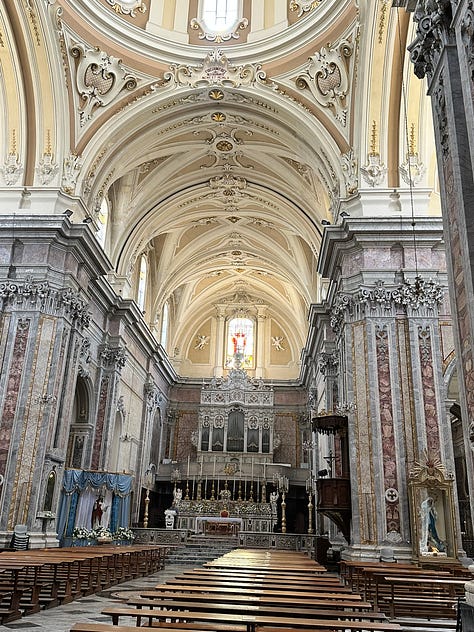
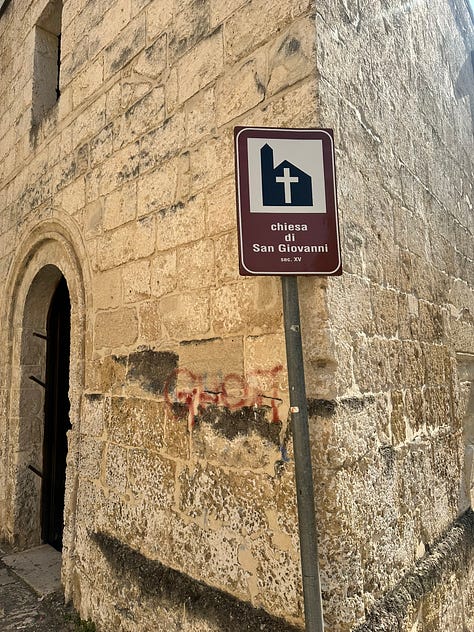
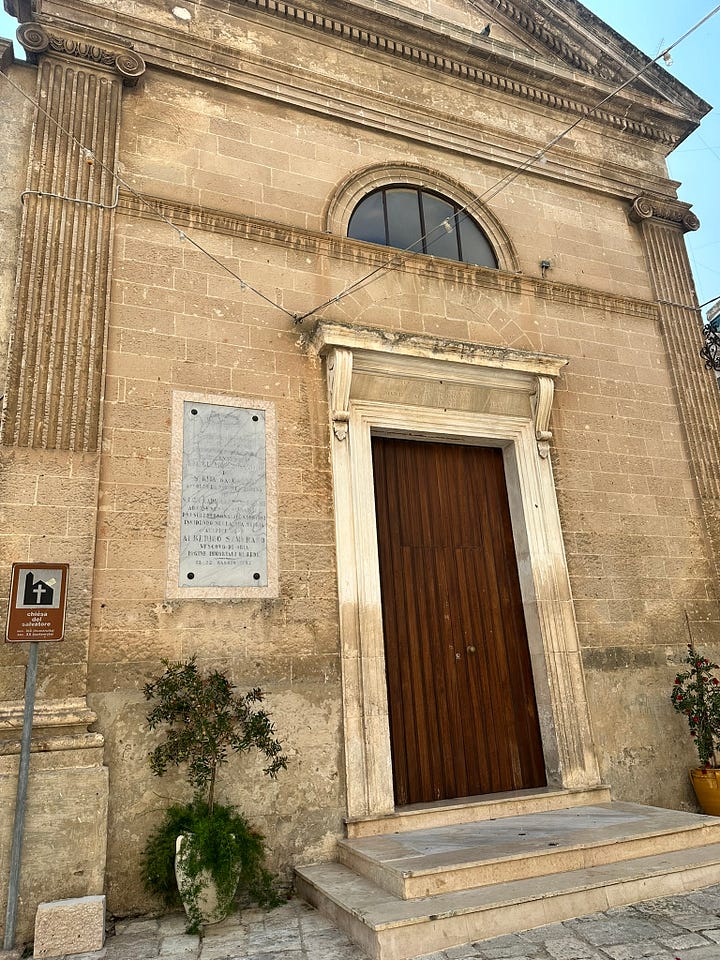

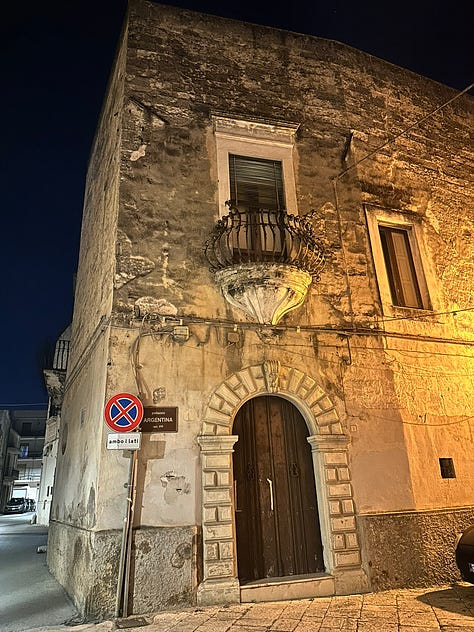
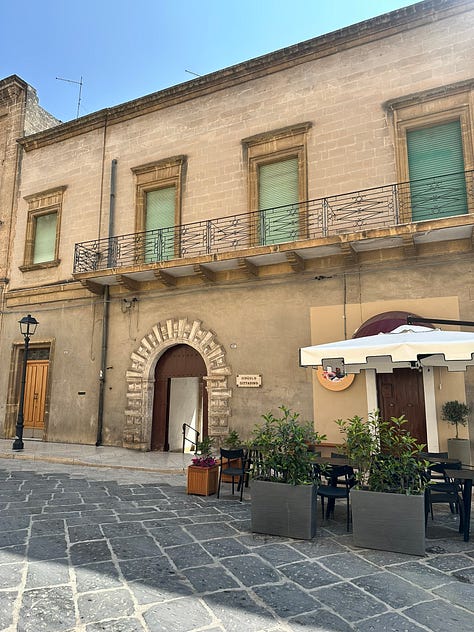
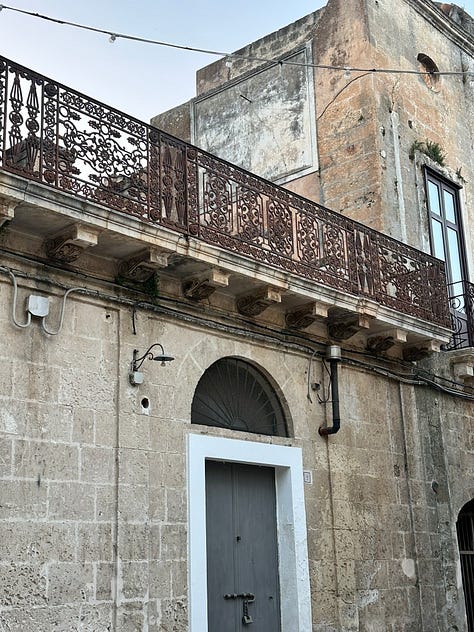

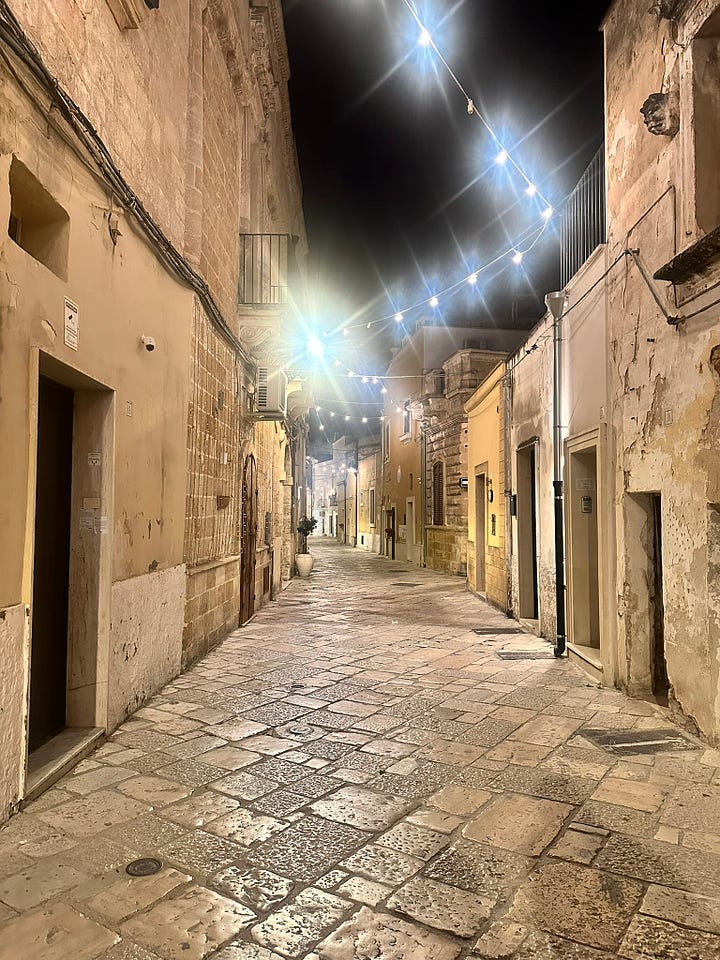
First and second are houses where Argentinas have lived, a sundial on a building in via San Giovanni, bottom left is via Roma, and bottom right is via San Giovanni at night.
This book with parchment cover and cloth paper pages was begun in 1643, and it contains records of births and deaths in the family to this century.
Thank you for your attention, and I plan to offer some observations on the North American part of my peregrinations in a couple of weeks, before returning in August to the regularly scheduled programming with family history from the early 1600s.





Your writing, even unedited, is such an easy and interesting read, Roberto. Each time I read about Francavilla and the Argentinas I feel like I am one of the family learning about those who came before me. Enjoy your trip home.